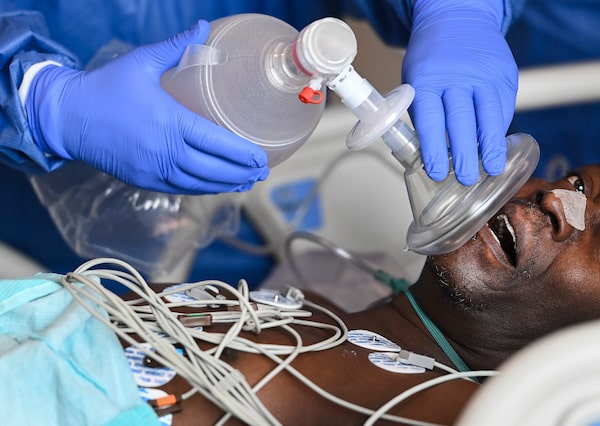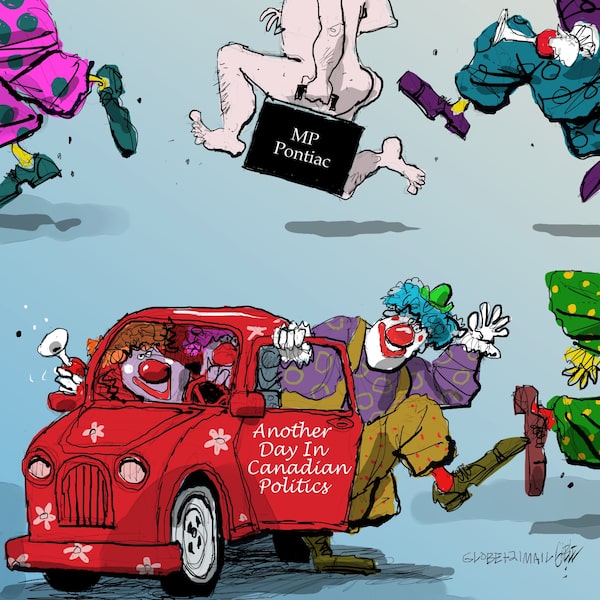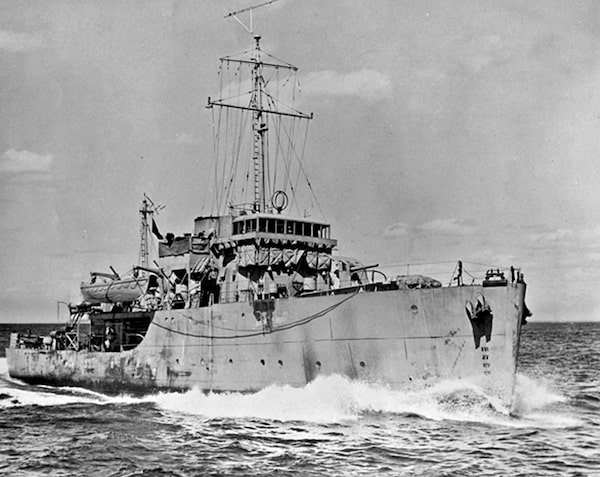Good morning,
More than 10,000 pages of unsealed court documents show that dealings between a senior Toronto hospital executive and a construction company chief executive officer were far more extensive than reported so far, and the pair went to great lengths to conceal them.
Vas Georgiou was chief administrative officer of St. Michael’s Hospital from 2013 to 2015, and John Aquino was CEO of Bondfield Construction Co. Ltd. when it won a coveted contract to create a $300-million project that is mired in protracted delays.
The unsealed documents were filed by Zurich Insurance Co. Ltd., which issued surety bonds on the project. The multinational insurer alleges Georgiou received kickbacks, including free home renovations, and “secretly obtained” shares, worth at least $500,000, in companies owned by Aquino.
The records were released after The Globe successfully fought a judge’s order that sealed them.
The emergency entrance to St. Michael's Hospital, in downtown Toronto, is photographed on Oct. 21 2020.Fred Lum/The Globe and Mail
This is the daily Morning Update newsletter. If you’re reading this on the web, or it was forwarded to you from someone else, you can sign up for Morning Update and more than 20 more Globe newsletters on our newsletter signup page.
COVID-19 infections hit record highs
Ontario’s government is expected to announce a series of tougher COVID-19 measures today as the province faces warnings it could soon be struggling with up to 18,000 new infections a day. Ontario is set to unveil staggering new predictions from its COVID-19 science advisory table after meeting late yesterday.
In photos: Canadian Press photographer Nathan Denette captures ICU workers, in hard-hit Toronto, who are witnessing the human side of the startling numbers firsthand.

A 60-year-old COVID-19 patient fights for his life, desperately gasping for air as head intensivist Dr. Ali Ghafouri provides life saving medical care in an emergency situation in the intensive care unit at the Humber River Hospital during the COVID-19 pandemic in Toronto on Tuesday, April 13, 2021. The patient was intubated and put on a ventilator successfully.Nathan Denette/The Canadian Press
Meet the COVID-19 ‘vaccine hunters’: Vaccine Hunters Canada is a volunteer initiative that helps those eligible for vaccines pinpoint the often elusive information about actually booking an appointment. “Overall I don’t have a definitive number of how many people we’ve helped. But it’s got to be in the thousands at this point,” Joshua Kalpin said.
British Columbia is prioritizing teachers and school staff working in COVID-19 hot spots for vaccination, even though newly presented data show transmissions are relatively low at schools.
Nunavut’s capital city, Iqaluit, is under a lockdown after detecting its first case of COVID-19 since the start of the pandemic.
Opinion: If we want to be ready for the next pandemic, Canada’s biotech industry will need to be stronger
Conservatives unveil loyalty-card style of carbon pricing
Conservative Leader Erin O’Toole released his party’s climate plan yesterday as he pledged to put a price on carbon for consumers.
Under the plan, Canadians would pay into a personal low-carbon savings account each time a hydrocarbon-based fuel is purchased. They can then use their savings-account card toward things the party said will help them live “a greener life,” such as a transit pass or a bicycle. By comparison, the government’s pricing regime rebates the estimated cost of fuel charges to residents when they file their income taxes.
- Campbell Clark: Conservatives’ new carbon plan would provide incentives to burn more fuel
- Editorial Board: The Conservatives just had a carbon-price epiphany. Good for them. Good for Canada
Got a news tip that you’d like us to look into? E-mail us at tips@globeandmail.com Need to share documents securely? Reach out via SecureDrop
ALSO ON OUR RADAR
‘Fear of reprisal’ for speaking out in Forces: Senior women of the Canadian Armed Forces told members of Parliament that the military needs to work on preventing sexual misconduct and foster a culture where there are no reprisals for speaking out.
Beijing accuses journalists of ‘anti-China propaganda’: Criticism of China, Beijing has made clear, can be considered a threat to the country – and punished as such.
Ukraine now says it believes Iran intentionally shot down Flight 752: Oleksiy Danilov, who as secretary of the National Defence and Security Council oversaw the early stages of Ukraine’s own investigation into the disaster, said Iran’s refusal to allow international investigators unfettered access to the evidence has convinced him that Iran shot the plane down on purpose.
At Prince Philip’s funeral, hymns will not be sung: The original plans for the Duke’s funeral included 800 guests. While some restrictions have been lifted recently, funerals have been capped at 30 people and singing during worship services has been limited to small choirs.
MORNING MARKETS
Global stocks hit a record high on Friday and oil climbed after strong U.S. and Chinese economic data bolstered expectations of a solid global recovery from the coronavirus-induced slump. Europe’s top indexes all opened higher, led by Britain’s FTSE 100, up 0.5% and passing 7,000 points for the first time since February 2020. U.S. stock futures pointed to a slightly lower open, with S&P futures down 0.1% and Nasdaq futures down 0.2% Overnight, Asian markets had tracked a path similar to Europe’s. MSCI’s broadest index of Asia-Pacific shares outside Japan was last up 0.5%, with Shanghai shares adding 0.8% and Japan’s Nikkei up 0.1%.
WHAT EVERYONE’S TALKING ABOUT
Canada has all the ingredients to be a global leader in agriculture, but the opportunity won’t last forever
David Dzisiak: “We are on the cusp of perhaps one of the most consequential disruptions of the agriculture, food and feed industries. Agriculture also needs to double food production for a growing population that wants to eat better.”
If Canada is serious about reconciliation, we need an Indigenous Supreme Court judge
Kent McNeil and Brooks Arcand-Paul: “This lack is a matter of political will. Is Canada prepared to adopt an approach that confirms that Indigenous people have the right to be involved in decisions that impact them?”
TODAY’S EDITORIAL CARTOON

Brian Gable/The Globe and Mail
LIVING BETTER
Students should take advantage of tax time
Postsecondary students probably didn’t have the best school year, but maybe a little more money in your pocket would brighten your day. So Tim Cestnick wants to share some ideas to consider this tax season.
For example, if you’re thinking of combining all your debts into a single loan at a more attractive interest rate, keep in mind that you may want to exclude your student loan if you’re able to claim a credit for the interest on that loan. Also before you claim tuition, education and textbook tax credits, consider that you can transfer as much as $5,000 of these costs to a parent, grandparent or supporting spouse or carry them forward for use in a later year.
MOMENT IN TIME: April 16, 1945

Undated photo of the Canadian minesweeper HMCS Esquimalt, which sank off the waters near Halifax, within sight of the shore, just three weeks before the end of the war in Europe, April 16, 1945.Canada. Department of National Defence
HMCS Esquimalt sunk
Germany was three weeks away from surrendering when the HMCS Esquimalt was sunk off the East Coast, claiming more than 40 lives. In the evening of April 15, the Bangor class minesweeper departed Halifax for a routine anti-submarine patrol and a scheduled rendezvous with HMCS Sarnia at 8 a.m. the next day. But at about 6:30 a.m., the Esquimalt was torpedoed by U-190, a German U-boat. The ship sank in less than five minutes, along with 28 of its crew. The remaining 43 crew members scrambled onto four Carley floats, but there was not enough room for all and some clung onto the sides in frigid waters. A plane flew overhead 10 minutes later but mistook them for fishing boats. The search for the Esquimalt only began in earnest near 10 a.m. when HMCS Sarnia reported the missed meeting. It was six hours after the sinking before survivors were found, with a further 16 men dying in the freezing water. Despite an intensive search for U-190, the submarine managed to escape detection but would later surrender and serve two years in the Canadian Navy. The Esquimalt was the last Canadian ship lost during the Second World War. Iain Boekhoff
If you’d like to receive this newsletter by e-mail every weekday morning, go here to sign up. If you have any feedback, send us a note.